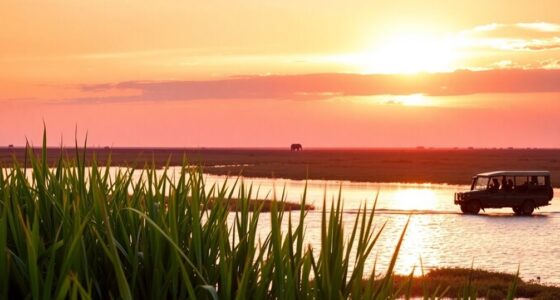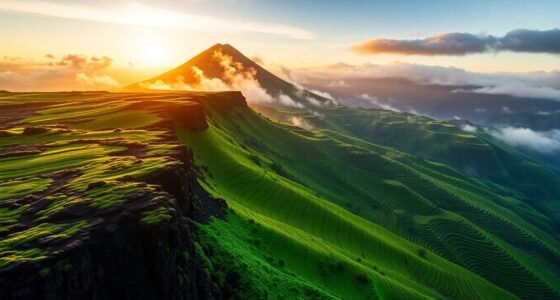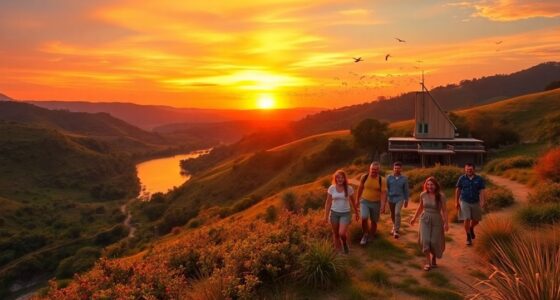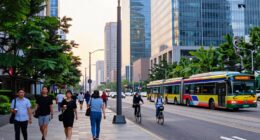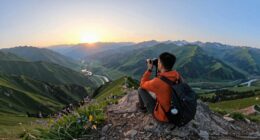If you're looking for an unforgettable travel experience, Rwanda's green gorilla adventures and eco-lodges are perfect for you. You'll trek through lush bamboo forests to encounter critically endangered mountain gorillas, all while staying in sustainable accommodations designed to minimize environmental impact. By choosing local guides and participating in community-led reforestation projects, you'll contribute to vital conservation efforts. The best months for wildlife viewing are June to September and December to February, ensuring excellent conditions for your adventures. Discover how you can make your trip more sustainable and engage with the local culture for an enriching experience.
Key Takeaways
- Rwanda is home to critically endangered mountain gorillas, with eco-lodges providing unique, immersive experiences in their natural habitat.
- Eco-lodges utilize sustainable practices, including solar energy, rainwater harvesting, and organic gardens to minimize environmental impact.
- Guided trekking experiences allow visitors to observe mountain gorillas while supporting conservation efforts and local communities.
- Community-led initiatives promote artisan crafts and sustainable income, enhancing visitor experiences and preserving traditional culture.
- Sustainable transportation options, like electric shuttles, connect Kigali International Airport to eco-lodges while aligning with Rwanda's carbon reduction goals.
Introduction
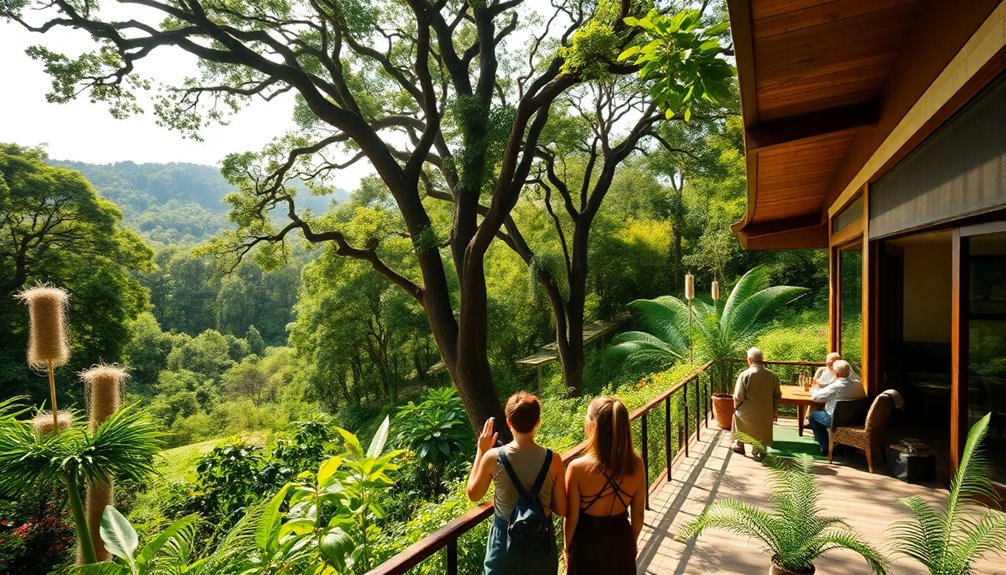
When you visit Rwanda, you're stepping into a vibrant rainforest that's home to the endangered mountain gorillas.
This lush habitat not only captivates with its beauty but also plays a crucial role in protecting these incredible creatures.
Gorilla Habitat in Lush Rainforest
Nestled within the mist-covered peaks of Rwanda, the lush rainforests of Volcanoes National Park serve as a vital sanctuary for the critically endangered mountain gorillas.
With a population of around 1,063 individuals, these remarkable gorillas thrive in misty bamboo forests that support diverse flora and fauna, essential for their survival.
You can embark on guided trekking experiences to engage with 12 habituated gorilla groups, ensuring minimal stress on them while promoting conservation tourism.
The unique biodiversity of the park, home to over 200 bird species and other wildlife like golden monkeys, enhances the ecological significance of this habitat.
Eco-lodges, such as Bisate Lodge, invite you to participate in local tree planting initiatives, further contributing to conservation efforts.
Protecting Endangered Gorilla Habitats
As you explore the stunning landscapes of Rwanda, you'll quickly realize how crucial it's to protect the habitats of the endangered mountain gorillas.
With around 1,063 of these magnificent creatures remaining, effective gorilla conservation is essential. Protected areas like Volcanoes National Park play a significant role in habitat protection, ensuring these gorillas thrive in their natural environment.
Tourism revenue directly supports local conservation efforts and community projects, making your visit impactful. Many eco-lodges, such as Bisate Lodge, invite you to participate in reforestation programs, allowing you to contribute to restoring vital habitats.
Travel From Kigali Airport

When you fly into Kigali, you'll find several options to get here, whether you're coming directly from the USA or connecting through Doha or Dubai.
Electric shuttle services also offer an eco-friendly way to start your adventure.
Once you land, planning your transportation ahead of time can make your journey to Rwanda's stunning landscapes smooth and enjoyable.
Fly From the USA to Kigali
How do you get to Rwanda's vibrant capital, Kigali, from the USA? Start by booking flights from the USA to Kigali International Airport (KGL).
Airlines like KLM, Brussels Airlines, and Qatar Airways offer connecting flights, with travel times typically ranging from 15 to 20 hours.
Upon arrival, ensure you have a valid passport, a visa—which you can obtain on arrival or online—and proof of a negative COVID-19 test taken within 72 hours prior to your flight.
Kigali Airport is just 10 kilometers from the city center, allowing easy access to various eco-lodges and attractions.
For transportation options, consider taxis, ride-hailing services like Uber, or pre-arranged transfers through your chosen eco-lodge for a smooth start to your adventure.
Fly Direct to Kigali
Wondering about the best way to start your adventure in Rwanda? Fly directly into Kigali International Airport (KGL), the main gateway to this beautiful country.
With direct flights from major cities in Europe, Africa, and the Middle East, your journey is convenient and hassle-free. Once you land, it's just a quick 10-kilometer drive to the city center, where you can easily arrange transportation to eco-lodges like Bisate Lodge or One&Only Gorilla Nest, both near Volcanoes National Park for unforgettable gorilla trekking experiences.
Before you travel, make sure you check the visa requirements and health precautions to ensure a smooth entry.
Enjoy the modern facilities at the airport, including lounges and restaurants, before embarking on your Rwandan adventure!
Fly via Doha or Dubai
Looking to extend your adventure after landing in Kigali? Consider flying via Doha or Dubai. Both Qatar Airways and Emirates offer connecting flights from Kigali International Airport (KGL) to these vibrant cities, making your journey even more exciting. Here's a quick look at what you can expect:
| Destination | Flight Duration | Airport Amenities |
|---|---|---|
| Doha | ~8 hours | Shopping, Dining, Relaxation Lounges |
| Dubai | ~6 hours | Shopping, Dining, Relaxation Lounges |
| Connecting Flights | Multiple Daily Departures | Top-notch Services |
| Layover Exploration | Yes | Cultural Attractions |
With extensive layover options, you can explore these dynamic hubs before continuing your journey. Enjoy the top-notch amenities at the airports and make the most of your travel experience!
Electric Shuttle Services Available
As you arrive at Kigali International Airport, you'll find convenient electric shuttle services ready to whisk you away to various eco-lodges and tourist attractions across Rwanda.
These electric shuttles offer a sustainable transportation option that aligns with Rwanda's commitment to reducing carbon emissions and promoting eco-friendly travel practices.
Equipped with modern amenities, they ensure a comfortable journey as you traverse the stunning landscapes of this beautiful country.
By choosing these shuttle services, you actively contribute to Rwanda's environmental conservation efforts and help safeguard its rich biodiversity.
Embrace the opportunity to travel responsibly while enjoying the scenic beauty that Rwanda has to offer, knowing your choice supports a greener future for all.
Sustainable Wildlife Photography Tours
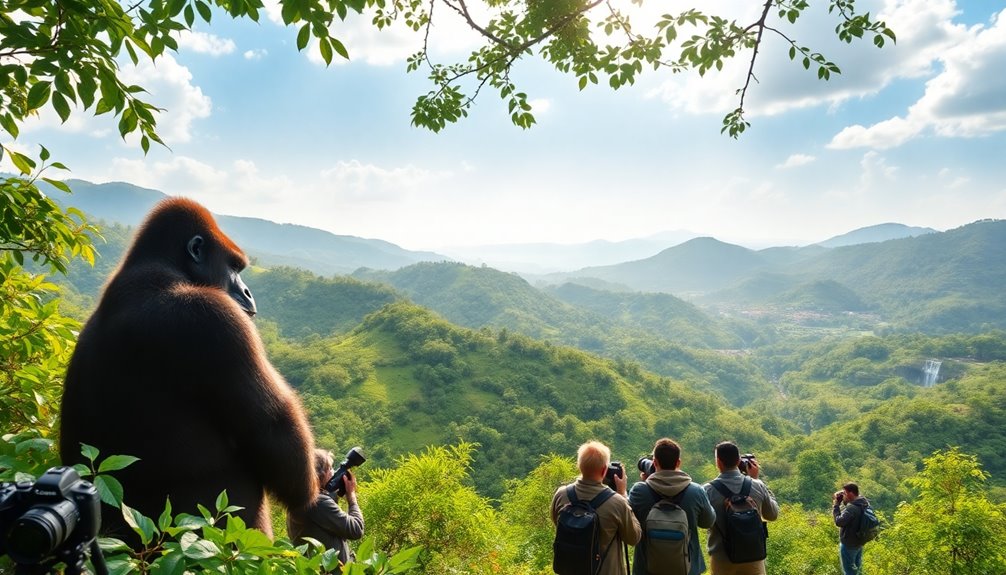
When you embark on a sustainable wildlife photography tour in Rwanda, you'll engage in eco-friendly encounters with some of the world's most endangered species.
These tours not only focus on capturing stunning images but also prioritize responsible tracking and the preservation of natural habitats.
Staying in sustainably designed lodges enhances your experience while supporting local communities and conservation efforts.
Eco-Friendly Wildlife Encounters
Rwanda invites you to embark on eco-friendly wildlife encounters that celebrate both nature and responsible tourism.
Join sustainable wildlife photography tours that take you through the mist-covered bamboo forests of Volcanoes National Park, where you can capture stunning images of endangered mountain gorillas in their natural habitats.
These intimate tours, designed for small groups, ensure a minimal impact on wildlife while allowing you to learn about vital conservation efforts.
You'll also engage with local communities through initiatives like tree planting, directly supporting their livelihoods.
After a day of exploration, unwind in luxury accommodations like Bisate Lodge or Singita Kwitonda Lodge, which prioritize environmental sustainability and offer breathtaking views, enhancing your unforgettable photography experience.
Sustainable Wildlife Tracking Tours
While exploring the breathtaking landscapes of Volcanoes National Park, you'll have the chance to participate in sustainable wildlife tracking tours that prioritize ethical encounters with nature.
These tours offer unforgettable gorilla trekking experiences, allowing you to observe endangered mountain gorillas and golden monkeys while ensuring sustainable wildlife encounters. With a maximum of eight visitors per group, you'll contribute to responsible tourism and minimal disturbance to wildlife.
You'll also learn about vital conservation efforts and environmental protection, enhancing your appreciation for local ecosystems.
Sustainable Lodge Design Features
Embracing sustainability in lodging, eco-lodges like Bisate Lodge and Singita Kwitonda Lodge showcase design features that harmonize with their stunning surroundings. They utilize sustainable building practices and local materials, minimizing environmental impact while enhancing your experience. You'll notice unique structures resembling giant bird nests, promoting wildlife conservation.
These lodges often feature:
| Design Feature | Description |
|---|---|
| Solar Energy | Reduces reliance on non-renewables |
| Rainwater Harvesting | Supports water conservation |
| Composting Toilets | Eco-friendly waste management |
| Organic Gardens | Provides seasonal ingredients for meals |
| Conservation Activities | Opportunities to engage in reforestation |
With farm-to-table dining experiences and eco-friendly tourism practices, your stay not only supports local agriculture but also connects you to the environment.
Choose Local Guides
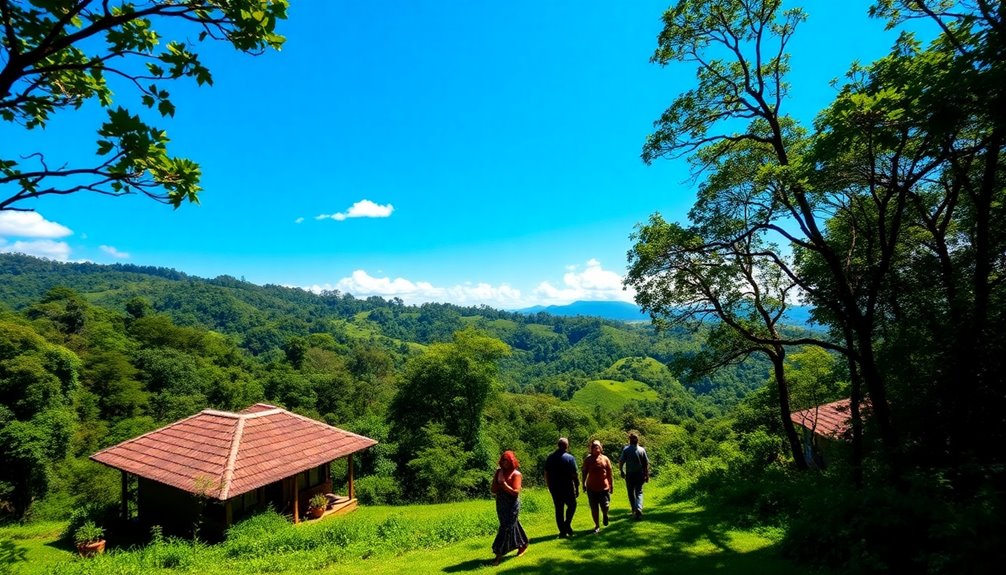
Choosing local guides for your gorilla trekking adventure not only enriches your experience but also supports the communities that depend on tourism for their livelihoods.
Local guides bring extensive knowledge of the region's flora, fauna, and cultural heritage, providing you with valuable insights during your trek. By engaging these guides, you actively promote conservation efforts, as many are involved in community-based tourism initiatives aimed at protecting endangered mountain gorillas.
Their familiarity with the terrain ensures a safer and more efficient journey through challenging landscapes. Plus, opting for local guides contributes to sustainable tourism practices, ensuring that a portion of your tourism revenue directly benefits local communities and fosters economic development in Rwanda.
Community-Led Reforestation Projects
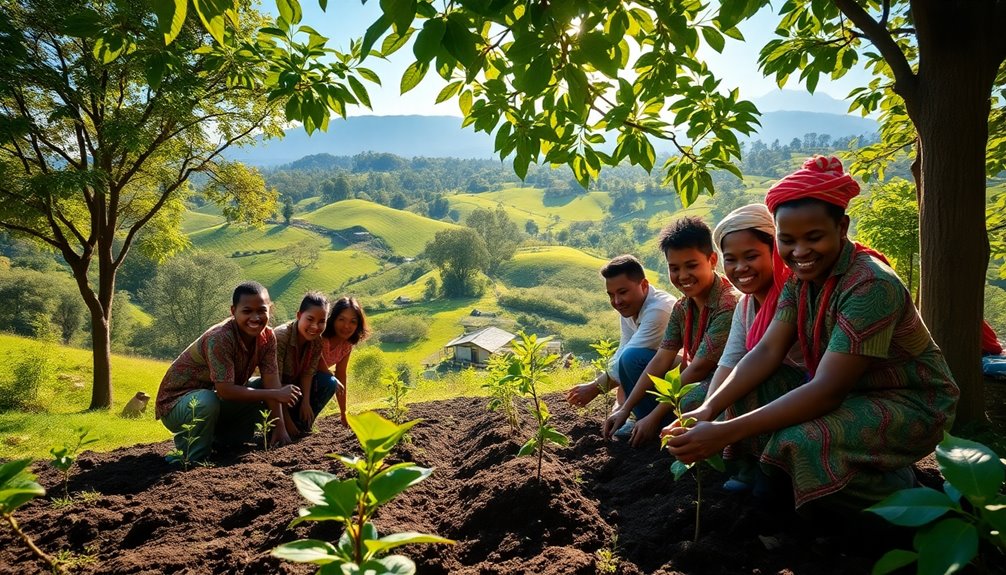
When you participate in Rwanda's community-led reforestation projects, you're not just planting trees; you're also supporting local culture and sustainability.
These initiatives, backed by government and NGO efforts, create a powerful link between conservation and community wellbeing.
Government and NGO Efforts
As Rwanda strives to combat environmental degradation, community-led reforestation projects have emerged as a vital strategy, driven by both government initiatives and NGO partnerships.
The Rwandan government aims to plant 1 million trees annually, restoring degraded landscapes and enhancing conservation efforts for endangered species like mountain gorillas.
NGOs, such as the Dian Fossey Gorilla Fund, engage local communities in sustainable agriculture and tree planting initiatives, fostering a sense of ownership in these projects.
With over 30,000 community members participating in community-based programs, local cooperatives provide essential training and resources.
These collaborative efforts not only improve livelihoods but also promote environmental sustainability, ultimately bolstering ecosystem resilience against climate change and aiding the recovery of vital habitats.
Community and Cultural Sustainability
Community-led reforestation projects in Rwanda not only restore ecosystems but also weave together the threads of local culture and communal identity. By participating in these initiatives, you support not just the environment but also local artisans and community development projects. Eco-tourism revenue plays a vital role, channeling funds into sustainable agricultural practices and reforestation efforts. Regular maintenance of these projects ensures long-lasting environmental stewardship that benefits both the community and the natural world.
| Project Type | Impact |
|---|---|
| Eco-Tourism Initiatives | Supports local economies |
| Reforestation Programs | Restores habitats for gorillas |
| Community Clean-Up Days | Fosters local pride |
| Artisans' Workshops | Promotes cultural heritage |
| Dian Fossey Fund Support | Enhances biodiversity efforts |
These projects embody environmental stewardship, ensuring a brighter future for both the community and nature.
Optimal Months for Eco-Tourism
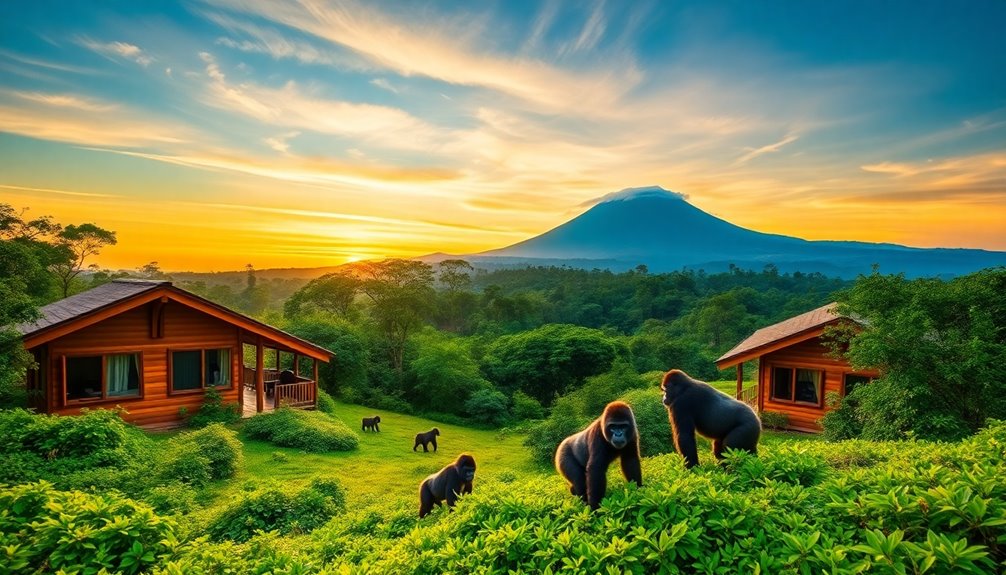
When planning your eco-tourism adventure in Rwanda, timing is key.
The best months for wildlife viewing fall during the dry seasons from June to September and December to February, ensuring you'll have optimal trekking conditions.
Avoid the rainy season if you want to make the most of your gorilla treks and enjoy vibrant landscapes.
Best Months for Wildlife Viewing
The optimal months for wildlife viewing in Rwanda fall during the dry seasons, specifically from June to September and December to February. These are the best months for wildlife viewing, as animals are more active and easier to spot.
In Volcanoes National Park, the thinning vegetation enhances visibility for seeing the endangered mountain gorillas and other wildlife. January and February are particularly favorable for birdwatching, with many migratory species present.
Rainy Season Impact on Trekking
While trekking during Rwanda's rainy season can present challenges, it also offers a unique opportunity to experience the country's stunning landscapes and rich biodiversity in a quieter setting. You'll enjoy lush landscapes, fewer tourists, and the chance to connect deeply with nature. However, be prepared for muddy trails and increased humidity.
| Rainy Season | Impact on Trekking |
|---|---|
| March to May | Muddy trails, vibrant flora |
| October to November | Humidity, fewer tourists |
| Eco-lodges | Sustainability-focused experiences |
| Trekking conditions | Challenging yet rewarding |
| Wildlife encounters | Unique moments in secluded nature |
Though the dry seasons are optimal, the rainy season offers eco-lodges like Bisate Lodge, emphasizing sustainability and reforestation activities.
How to Make Your Trip More Sustainable
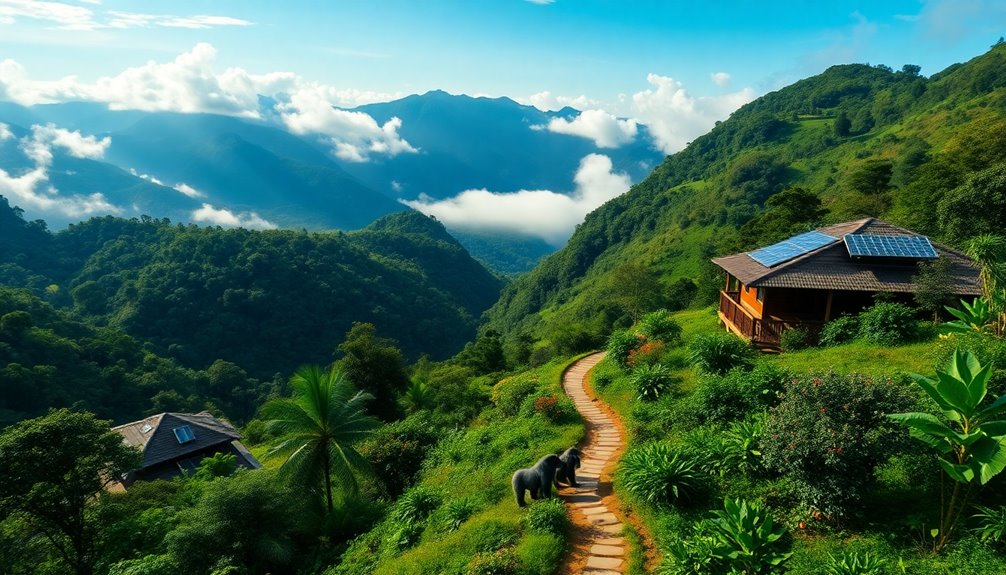
To make your trip to Rwanda more sustainable, start by packing biodegradable toiletries and supplies to minimize waste.
You'll also want to support local artisans by purchasing their crafts, helping to preserve their culture and boost the economy.
These small choices can have a big impact on both the environment and the communities you visit.
Biodegradable Toiletries and Supplies
Choosing biodegradable toiletries and supplies can dramatically enhance your eco-friendly travel experience in Rwanda. By making mindful choices, you can significantly reduce your environmental impact while enjoying your stay at eco-lodges.
Here are some sustainable options to consider:
- Biodegradable toiletries: Use shampoo bars and biodegradable soaps to cut down on plastic waste.
- Reusable supplies: Bring bamboo toothbrushes and stainless steel razors, minimizing single-use plastics.
- Refillable containers: Many eco-lodges, like Bisate Lodge, provide refillable containers for your toiletries, encouraging sustainability.
- Biodegradable sanitary products: Opt for organic cotton tampons or menstrual cups for eco-friendly periods.
Supporting lodges that prioritize these supplies not only enhances your experience but also contributes to ongoing conservation efforts in Rwanda's rich biodiversity.
Support Local Artisans' Crafts
Supporting local artisans' crafts not only enriches your travel experience but also plays a crucial role in sustaining Rwanda's vibrant culture. By choosing to buy handcrafted items, you directly support local artisans who preserve traditional artistic techniques. Many eco-lodges, like One & Only Gorillas Nest, feature curio shops where you can purchase these unique crafts, ensuring that profits benefit the community. Participating in workshops also provides a sustainable income source for craftsmen, fostering economic development. Engaging with community-led projects initiated by former poachers helps you contribute to conservation while supporting livelihoods. Together, these actions promote sustainable tourism and maintain the authenticity of Rwandan culture.
| Support Local Artisans | Eco-Lodges | Handcrafted Items |
|---|---|---|
| Community-led Projects | Traditional Techniques | Sustainable Tourism |
Frequently Asked Questions
How Much Does It Cost to See a Gorilla in Rwanda?
To see a gorilla in Rwanda, you'll need to budget for a trekking permit, which costs USD 1,500 per person.
Accommodations can range from USD 240 to over USD 2,800 per night, depending on the lodge's luxury level.
Don't forget additional expenses like guided services, transportation to Volcanoes National Park (around USD 350), meals, and tips.
Planning for these costs will enhance your overall gorilla trekking experience.
What Is the Best Time to See Gorillas in Rwanda?
Imagine trekking through lush, green hills under a bright blue sky, or navigating muddy trails under gloomy clouds.
The best time to see gorillas in Rwanda is during the dry seasons, from June to September and December to February. You'll find the trails easier to manage, and wildlife activity peaks, enhancing your experience.
Just remember to book your trekking permit in advance, as spots fill up quickly during these popular months.
Is Rwanda Gorilla Trekking Safe?
Yes, gorilla trekking in Rwanda is safe.
You'll benefit from the strong presence of park rangers and strict regulations that minimize stress on the wildlife.
With mandatory health screenings for trekkers and limited group sizes, your encounters will be respectful and controlled.
You'll also have to follow guidelines, like keeping a distance of at least 7 meters from the gorillas, ensuring safety for both you and these magnificent creatures.
How Much Is Bisate Lodge?
If you're wondering how much Bisate Lodge costs, expect to pay around USD 1,200 per person per night.
This price includes meals and various activities, ensuring you get a fulfilling experience.
The lodge features six luxury Forest Villas that offer breathtaking views of the nearby volcanoes.
Plus, with amenities like a spa and farm-to-table dining, you'll find it's worth the investment for an unforgettable stay.
Conclusion
By choosing Rwanda for your next adventure, you're not just experiencing breathtaking landscapes and unique wildlife; you're also supporting a vibrant ecosystem. Did you know that over 1,000 endangered mountain gorillas roam the Virunga Massif region? Imagine being just a few feet away from these magnificent creatures in their natural habitat, all while contributing to their conservation. So pack your bags, embrace eco-tourism, and make a lasting impact on both the environment and local communities!



